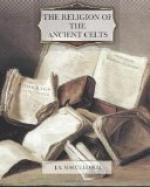The relation of Lug to Cuchulainn deserves further inquiry. While the god is reborn he is also existing as Lug, just as having been swallowed as a worm by Dechtire, he appears in his divine form and tells her he will be born of her. In the Tain he appears fighting for Cuchulainn, whom he there calls his son. There are thus two aspects of the hero’s relationship to Lug; in one he is a rebirth of the god, in the other he is his son, as indeed he seems to represent himself in The Wooing of Emer, and as he is called by Laborcham just before his death.[1209] In one of the birth-stories he is clearly Lug’s son by Dechtire. But both versions may simply be different aspects of one belief, namely, that a god could be reborn as a mortal and yet continue his divine existence, because all birth is a kind of rebirth. The men of Ulster sought a wife for Cuchulainn, “knowing that his rebirth would be of himself,” i.e. his son would be himself even while he continued to exist as his father. Examples of such a belief occur elsewhere, e.g. in the Laws of Manu, where the husband is said to be reborn of his wife, and in ancient Egypt, where the gods were called “self-begotten,” because each was father to the son who was his true image or himself. Likeness implied identity, in primitive belief. Thus the belief in mortal descent from the gods among the Celts may have involved the theory of a divine avatar. The god became father of a mortal by a woman, and part of himself passed over to the child, who was thus the god himself.
Conchobar was also a rebirth of a god, but he was named from the river whence his mother had drawn water containing the worms which she swallowed. This may point to a lost version in which he was the son of a river-god by Nessa. This was quite in accordance with Celtic belief, as is shown by such names as Dubrogenos, from dubron, “water,” and genos, “born of”; Divogenos, Divogena, “son or daughter of a god,” possibly a river-god, since deivos is a frequent river name; and Rhenogenus, “son of the Rhine."[1210] The persons who first bore these names were believed to have been begotten by divinities. Mongan’s descent from Manannan, god of the sea, is made perfectly clear, and the Welsh name Morgen = Morigenos, “son of the sea,” probably points to a similar tale now lost. Other Celtic names are frequently pregnant with meaning, and tell of a once-existing rich mythology of divine amours with mortals. They show descent from deities—Camulogenus (son of Camulos), Esugenos (son of Esus), Boduogenus (son of Bodva); or from tree-spirits—Dergen (son of the oak), Vernogenus (son of the alder); or from divine animals—Arthgen (son of the bear), Urogenus (son of the urus).[1211] What was once an epithet describing divine filiation became later a personal name. So in Greece names like Apollogenes, Diogenes, and Hermogenes, had once been epithets of heroes born of Apollo, Zeus, and Hermes.




